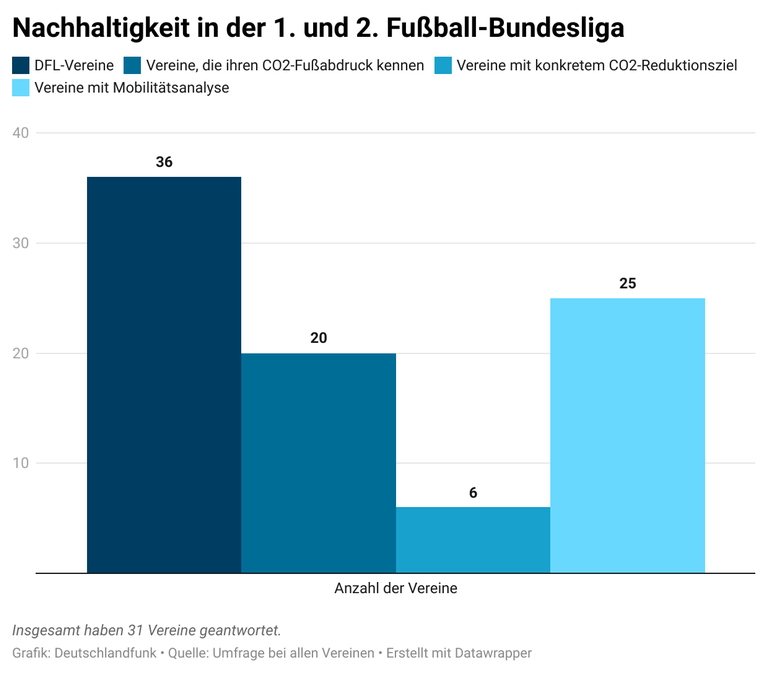
Bundesliga's Sustainability Revolution: Aiming for Carbon Neutrality
In a groundbreaking move, the German Football League (DFL) is set to transform the Bundesliga and 2.Bundesliga into the world's first professional football leagues to achieve carbon neutrality. This ambitious initiative reflects a profound commitment to sustainability, resonating with fans and stakeholders alike as clubs across Germany strive to minimize their environmental impact. The DFL's plan, which will culminate in a pivotal vote this December, could redefine the operational landscape of football, embedding ecological responsibility at the heart of the beautiful game.

The Road to Carbon Neutrality
The DFL's sustainability initiative is not merely a compliance exercise; it represents a fundamental shift in how football clubs operate in relation to their environmental footprint. The goal is to establish comprehensive environmental targets that will be integrated into the regulatory framework governing Germany's professional leagues. As clubs prepare for this transformation, the message is clear: taking care of the planet is as vital as winning trophies.
“We want to lead the way in sports sustainability,” said DFL spokesperson Christoph Schickhardt. “This initiative is about setting an example, not just for football but for all sports around the globe.”
The call for this change has already borne fruit. Clubs like Mainz 05 have made significant strides by becoming the first carbon-neutral club in Germany, serving as a trailblazer for others. Their achievement sets a precedent that other clubs can emulate, encouraging a league-wide commitment to sustainable practices.
A Vote for the Future
As the Bundesliga gears up for this environmental overhaul, all eyes are on the vote scheduled for December. This decision will be crucial in determining how clubs will implement sustainability measures, from reducing carbon emissions to enhancing energy efficiency. The proposed regulations would compel clubs to adopt eco-friendly practices, including using renewable energy sources, minimizing waste, and promoting sustainable transportation options for fans and players.
The implications of this initiative could resonate beyond Germany, potentially inspiring similar movements in other football leagues worldwide. The Bundesliga's proactive stance on sustainability could position it as a role model for global sports governance, illustrating how professional sports can contribute positively to environmental stewardship.
The Fans' Perspective
Fans are not just passive observers in this transformation; they are actively engaged and supportive of sustainable practices. Many supporters view the push for carbon neutrality as an extension of their loyalty to clubs, aligning their passion for football with a commitment to the environment.
“It’s heartening to see our league taking these steps,” remarked longtime Bayern Munich fan Lars Müller. “Football has a massive following, and if we can use that influence to promote sustainability, it's a win-win for everyone.”
This sentiment is echoed across stadiums in Germany, where fans are increasingly advocating for climate-conscious decisions from their clubs. The Bundesliga's initiatives could harness this momentum, creating a cultural shift within the sport.
The Bigger Picture: A Global Movement
The Bundesliga's sustainability initiative comes at a time when climate change is one of the most pressing issues facing the planet. The sports world is increasingly recognizing its role in climate action, with several leagues and organizations beginning to address their environmental impacts. The DFL’s efforts could catalyze a broader movement in professional sports, promoting a collective responsibility to safeguard the environment.
Research from organizations like the Sports Environment Alliance indicates that sports leagues can significantly influence public behavior regarding sustainability. As the Bundesliga embarks on this journey, it could inspire leagues from the English Premier League to La Liga to adopt similar initiatives, amplifying the message of environmental responsibility.
The Challenges Ahead
Implementing carbon neutrality within the Bundesliga will not be without challenges. Clubs must navigate various obstacles, including financial constraints, logistical concerns, and the overarching need for broad consensus among all stakeholders. Nevertheless, the DFL appears committed to overcoming these hurdles, prioritizing environmental considerations in their operational strategies.
Additionally, the effectiveness of these measures will hinge on the commitment of each club. Clubs will need to evaluate their current practices and make substantial investments in sustainable infrastructure. For instance, transitioning to solar energy for stadiums and training facilities will require time and capital.
“It’s not an overnight process,” remarked Mainz's sustainability officer, Sandra Fischer. “But with the support of our fans and the league, we can make significant strides.”
Conclusion: Paving the Way for a Greener Football Future
The Bundesliga's quest for carbon neutrality is more than just a goal—it's a transformative movement that has the potential to reshape the relationship between football and environmental stewardship. As clubs prepare for the upcoming vote in December, the collective commitment to sustainability could redefine the operational landscape of football, creating a model that resonates well beyond Germany's borders.
In uniting clubs, fans, and stakeholders under the banner of sustainability, the DFL is setting a precedent that could inspire leagues worldwide. If successful, the Bundesliga's initiative might not only lead the way in sports sustainability but also create a legacy that extends far into the future of football.
As the beautiful game looks to embrace its ecological responsibility, one thing is clear: the future of football may very well depend on how it responds to the challenges posed by climate change. Through proactive measures and a commitment to carbon neutrality, the Bundesliga is poised to lead the charge toward a greener, more sustainable future for football.
For more on this initiative and updates on the vote, check out the detailed analysis in Versus.